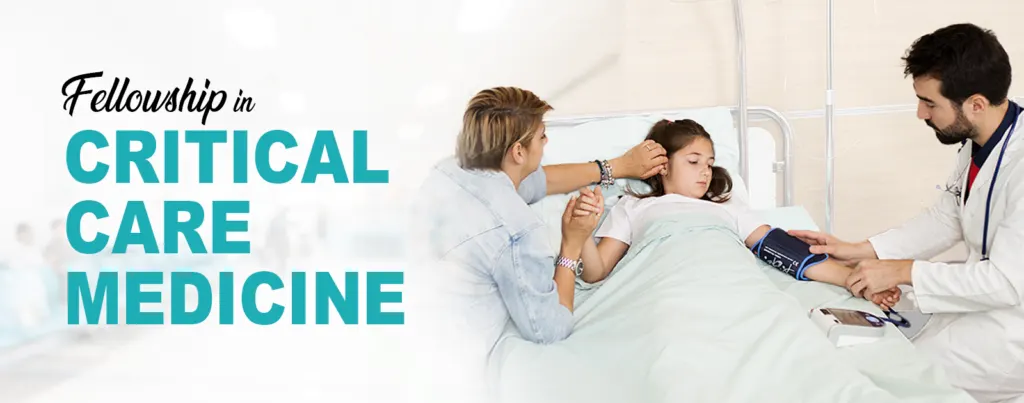
Critical Care Medicine (CCM) is a vital discipline of medicine that focuses on diagnosing and managing life-threatening conditions requiring advanced organ support and close monitoring. Presently, in India, this field has gained importance rapidly, especially with the rise in severe infections, trauma, and chronic diseases. To address the growing need for skilled professionals and enhance clinical competence, a fellowship in Critical Care Medicine seems to be an ideal step.
Critical Care Medicine primarily involves managing patients with critical illnesses and injuries in the intensive care units (ICUs). These units are equipped with advanced medical technology and staffed by well-trained medical professionals who provide continuous care to stabilise and support patients during the acute phases of their illnesses or injuries.
In the case of India, there are numerous healthcare challenges due to its large population, varied healthcare infrastructure, and increasing prevalence of both communicable and non-communicable diseases.
Critical care medicine is crucial for addressing these challenges by ensuring timely and specialised treatment for patients with life-threatening conditions. This speciality is vital in tertiary care hospitals and smaller healthcare facilities aiming to improve their critical care capabilities.
MediCOLL Learning is an educational platform that offers facilitated and CPD-accredited programs, including certificates and fellowships, to help medical professionals build a strong professional career and deliver the best patient outcomes.
The Critical Care Medicine Fellowship offered by MediCOLL Learning follows a hybrid format, which comprises online sessions followed by clinical training in a super-speciality hospital under the supervision. Critical care specialists lead the session and clinical training, bringing a wealth of experience and knowledge.
Pursuing a fellowship in Critical Care Medicine allows the medical professional to learn at their own convenience while managing their professional responsibilities. The fellowship programs are curated with the hectic schedules of medical professionals in mind. If the online session is missed, the recorded classes are available and can be accessed through the Learning Management System (LMS).
Some of the other highlights of the fellowship are:
Specialised Training: The Fellowship program provides comprehensive clinical training in managing critically ill patients, with a focus on advanced life support techniques, invasive procedures, and the utilisation of modern diagnostic and treatment technologies.
Fully accredited fellowship: The fellowship is CPD-accredited and Collaborates with respected global institutions, such as the University of Liverpool, the Royal College of Physicians, the NHS (UK), and eIntegrity. This makes sure the fellowship is credible and relevant in both Indian and international contexts.
Structured Curriculum: The curriculum of the online Critical Care program is developed by experienced critical care specialists who bring along the knowledge and experiences that help the participants understand the concepts more clearly and build a strong foundation in critical care medicine.
Career Advancement: A fellowship boosts career prospects, leading to opportunities in leading hospitals, academic institutions, and research organisations.
Cardiovascular emergencies are life-threatening situations requiring immediate medical attention to prevent serious complications or death.
These cardiovascular emergencies include acute disorders affecting the heart and blood vessels, such as acute coronary syndromes, arrhythmias, heart failure, and cardiogenic shock.
Recognising the signs, symptoms, and proper responses to these conditions is essential for healthcare professionals and the general public. A few of the major cardiovascular emergencies are:
Acute Coronary Syndrome (ACS)
Acute Coronary Syndromes include conditions like myocardial infarction (heart attack) and unstable angina. They occur due to a sudden decrease in blood flow to the heart muscle, often caused by the rupture of fatty deposits in the coronary arteries.
Signs and Symptoms:
Immediate Response:
Arrhythmias
Arrhythmias are abnormal heart rhythms. The heart rhythms can be too fast, too slow, or irregular in rate. Some arrhythmias, like ventricular fibrillation, can be life-threatening and need immediate action.
Signs and Symptoms:
Immediate Response:
Heart Failure
Heart failure occurs when the heart is unable to pump enough blood to meet the body's needs. Acute heart failure can develop suddenly, often triggered by a heart attack, severe arrhythmias, or other conditions.
Signs and Symptoms:
Immediate Response:
Cardiogenic Shock
Cardiogenic shock occurs when the heart suddenly cannot pump enough blood, often triggered by a severe heart attack. The sudden stopping of pumping results in a significant drop in blood pressure and inadequate blood flow to vital organs.
Signs and Symptoms:
Immediate Response:
Although not all cardiovascular emergencies can be prevented, several measures can help lower the risk, which are detailed below:
The Fellowship in Critical Care Medicine in India offers a valuable and meaningful opportunity for medical professionals to advance their careers, acquire specialised knowledge, deliver optimal care and leave a positive impression on patients' lives.
With the rise of various health conditions and the increasing need for skilled critical care specialists, fellowship programs are paving the way for the future of healthcare in the country.
Medical professionals aiming to work in any clinical settings such as urban hospital or contribute to critical care education and research can reform their professional career with this fellowship.
© Copyrights 2025 Medicoll All rights reserved.